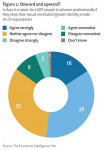Almost 80% of corporations believe Web 2.0 has the potential to increase revenues, says Economist Intelligence Unit
The most-cited effect of Web 2.0 - a collection of Web-based services that emphasize online collaboration and sharing among users - is to transform the way that companies interact with their customers. The study, which consisted of in-depth interviews with corporate leaders as well as a global survey of senior executives, found that large companies are already using Web 2.0 tools and methods in a variety of ways. So far, companies have focused their Web 2.0 efforts mainly on the creation of online communities that can help with product marketing or product development. In second place is the establishment of blogs or wikis to initiate conversations and share knowledge inside or outside the company.
In the future, companies expect Web 2.0 methods and tools to be the single biggest factor changing the ways their company interacts with customers (according to 68% of executives), or on how employees interact with each other and the company (49% of survey respondents).
These results form part of Serious business: Web 2.0 goes corporate, a newly released Economist Intelligence Unit report sponsored by FAST. The report examines how Web 2.0 is being applied - and will be applied in the near future - by large corporations throughout the world. The report is based on a survey of 406 senior executives - half from the C-suite - at large companies throughout the world, as well as interviews with Citigroup, JWT, Global Crossing and other major corporations.
“We were surprised by the level of excitement among big firms concerning the commercial possibilities presented by Web 2.0,” said Dan Armstrong, editor of the report. “Our survey respondents and interviewees saw Web 2.0 as an opportunity, not a threat, and were extremely creative in applying the idea of the collaborative network to their own products and processes.”
“The Economist study confirms what we’ve heard from customers and partners -- that collaborative Web 2.0 technologies are becoming more important to organizations,” said John M. Lervik, CEO of FAST. “We expect to see a rapid acceleration in the Web 2.0 adoption curve, as business leaders recognize the value of community-sourced information made accessible and actionable via search technology. Perhaps more interestingly, we expect to see Web 2.0 principles take off at the enterprise level, fundamentally changing how organisations innovate and execute.”
Other key findings of the report include:
· Customers are helping to develop and support products. Nearly 60% of the surveyed companies say that they are inviting customers to contribute content that explains, supports, promotes or enhances their products, or that they plan to do so within the coming two years. About half of companies say they are, or are planning to, treat customers as co-developers of products that are in a constant state of improvement.
· Ease of acquiring and supporting customers provide the biggest financial benefits. Most companies cited marketing and sales as an area where Web 2.0 could help to increase revenues, primarily through customer acquisition and service. Web 2.0 technologies were seen as a way to reduce costs in the areas of customer support, advertising and public relations, and product/service innovation.
· Early adopters are to be found in many countries and industries. Companies based in the US, Germany, China, India and the UK are among the early adopters of Web 2.0 tools and methods, according to the survey. The top early-adopter industries are entertainment and media, technology, travel and tourism and professional services.
· The C-suite is more enthusiastic than lower-level executives. A full 85% of C-suite executives see the sharing and collaboration aspects of Web 2.0 as an opportunity to increase revenue and/or margins, versus 75% of middle management. The C-suite is also more inclined to view Web 2.0 as transformative, affecting all parts of the business (35% versus 28%) and having a significant impact on the company’s business model (41% versus 22%).
· CFOs are the most skeptical about the potential of Web 2.0. Compared to CEOs and the rest of the C-suite, CFOs lag in understanding and support of Web 2.0 initiatives. CFOs are less likely to view Web 2.0 as transformative, less likely to think that it will affect all parts of the business, and less likely say that it will change the company’s business model. They are also less optimistic than their C-suite peers about Web 2.0’s potential to increase revenue and margins.
________________________________________
Notes for editors
About the report
Serious business: Web 2.0 goes corporate is a newly released Economist Intelligence Unit report sponsored by FAST. The Economist Intelligence Unit’s editorial team conducted the interviews on which the analysis is based and wrote the report. The survey consisted of 406 senior executives, from a range of industries, regions and company sizes.
About the Economist Intelligence Unit
The Economist Intelligence Unit is the world leader in global business intelligence. It is the business-to-business arm of The Economist Group, which publishes The Economist newspaper. The Economist Intelligence Unit provides geopolitical, economic and business analysis on more than 200 countries, as well as strategic intelligence on key industries and management practices. With over 300 full-time professionals in 40 offices around the world, supported by a global network of more than 700 contributing analysts, the Economist Intelligence Unit is widely known for its coverage of major and emerging markets. More information about the Economist Intelligence Unit can be found at www.eiu.com.
About FAST
FAST is the leading developer of enterprise search technologies and solutions that are behind the scenes at the world’s best-known companies with the most demanding search problems. Fast’s solutions are installed in more than 3,500 locations. FAST is headquartered in Oslo, Norway and Needham, Massachusetts and is publicly traded under the ticker symbol ‘FAST’ on the Oslo Stock Exchange. The FAST group operates globally with presences in Europe, North America, the Asia/ Pacific region, South America, the Middle East and Africa. For further information about FAST, please visit www.fastsearch.com
웹사이트: http://www.eiu.com
연락처
Edgar Fernandez
Marketing Manager, Asia-Pacific
(852) 2585 3826 이메일 보내기
Fax: (852) 2802 7007
이 보도자료는 Economist Intelligence Unit가(이) 작성해 뉴스와이어 서비스를 통해 배포한 뉴스입니다. 뉴스와이어는 편집 가이드라인을 준수합니다.




